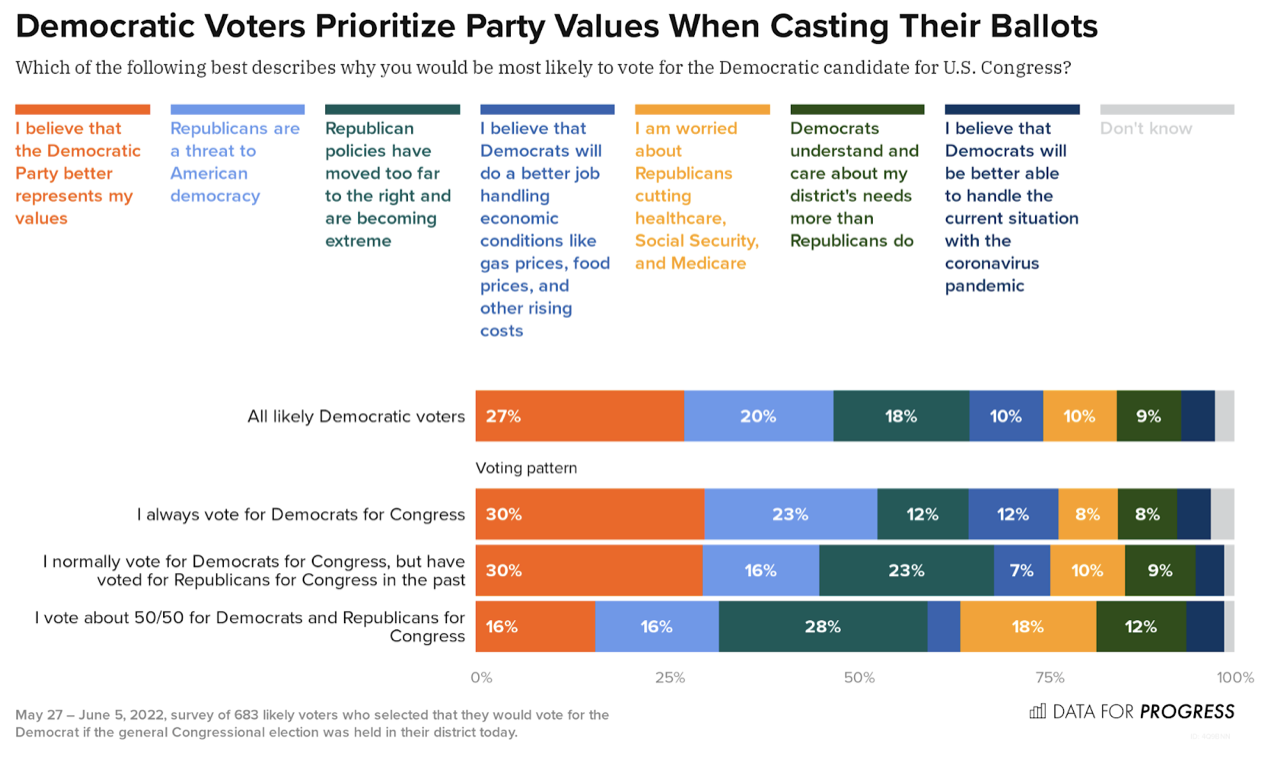Analyzing the Issues That Motivate Voters
By Dahlia Lyss
With the midterm elections fast approaching, we are wondering not only how will Americans vote but also why they are planning to vote that way. A new poll by Data For Progress examined the electorate in an effort to understand what exactly is motivating voters to vote. In a study of both Democratic likely voters and Republican likely voters, we find that Democratic voters are animated by party values while Republican voters are animated by economic issues.
Democrats Are Primarily Motivated by Party Values
Respondents who answered that they were likely to vote for a Democratic candidate in the upcoming midterm elections were then shown a Democrat-specific series of questions. First, we asked these respondents how they vote in congressional elections: if they always vote for Democratic candidates, if they generally vote for Democratic candidates but have voted for Republicans in the past, or if they vote for Democratic candidates and Republican candidates about equally. Second, we asked respondents for the most salient reason that they are choosing to vote Democratic this November. Respondents had a range of options to choose from, varying from points about party values, economic concerns, concerns about the future of American democracy, and the party’s handling of the coronavirus pandemic. The most commonly selected reason that respondents are planning to vote Democratic is that they believe the Democratic Party better represents their values.
We then looked at the reasons why respondents are planning to vote for Democratic candidates in November compared with their loyalty to the Democratic Party (how often they say they vote Democratic). Respondents who say that they always vote Democratic or almost always vote Democratic select party values as their most important reason for voting for Democrats. Meanwhile, the respondents who say that they vote about 50/50 for Democrats and Republicans choose fears about the Republican Party’s policies moving too far to the right as their most salient reason for voting blue in November.
We also gave respondents an opportunity to describe in their own words why they are planning to vote for Democrats in the midterm elections. Below are some of their responses:
“[The] values of the Democratic Party most closely fall in line with my personal values and things I believe in.”
“They uphold a majority of my values, especially for abortion rights and equality.”
“Democrats work harder for regular people.”
“Because the GOP is a sad, broken shell of its former self. I used to be a lifelong Republican. Not anymore.”
“I generally align more with the values of Democrats.”
Republicans Are Primarily Motivated by Economic Issues
We ran the same questions about party loyalty and reasons why voters are choosing to vote Republican in the upcoming midterm elections for likely Republican voters, but geared the questions and response options to Republicans. The most commonly selected reason that respondents are planning to vote Republican is that they believe that Republicans have better fiscal policies and will have a stronger response to inflation.
Then, just as we had done with the Democrats, we looked at the reasons that respondents are planning on voting for Republicans in the midterm elections compared with the frequency with which they vote for Republicans. Across all three voter categories, belief that Republicans will do a better job handling today’s unique economic challenges is the most popular reason. However, we see a split in the second-most popular choices in these groups. Among voters who always or almost always vote for Republican candidates, the belief that the Republican Party better aligns with their values is the second-most popular option. The group of respondents who vote for Republicans and Democrats about equally choose concerns about Democratic policies moving too far to the left as their second-most salient reason to vote red in November.
We also gave respondents an opportunity to describe their reasons for voting for Republicans in their own words. Below are some of their responses:
“Out of control gas prices and inflation.”
“I am not happy with the job Democrats have done.”
“They align with my morals.”
“Democrats are ruining the country, and I don’t believe in any of their policies.”
“Because the Democrats always spend too much and don’t care about the average Joe.”
The polling shows that Democrats currently prioritize party values while Republicans prioritize economic concerns. It is possible that it is not a coincidence that members of both parties chose these issues as their most salient concerns. These issues — party values for Democrats and economic issues for Republicans — are the issues on which politicians are focused and where they are considered to be “winning.” Perhaps the voters are simply responding to party messaging.
However, it is important to note that all voters are concerned about extremism on the opposite end of the political spectrum. Of the seven reasons we provided, extremism from the other party ranks third for both Democrats and Republicans. As November nears, it is essential that we continue to expand our understanding of the electorate and the concerns that motivate voters.
Dahlia Lyss is a research associate at Data for Progress.


